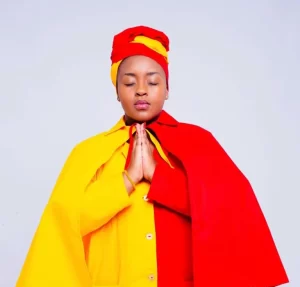Gogo Skhotheni sparks debate after revealing her ancestral calling was actually depression! Former reality TV star and well-known podcaster Gogo Skhotheni has stirred up intense conversations on social media after making a surprising revelation about her past as a sangoma. In a deeply personal moment during an exchange with Real Housewives of Durban alum Slee “The Boss Lady,” Skhotheni admitted that what she once believed was an ancestral calling may have actually been depression.




Her candid statement—“You are one of those who simply think they have a calling, kumbe it’s depression. Uzoba strong”—was reshared by celebrity blog Maphepha Ndaba, and quickly went viral. The remark shocked many of her followers and sparked both praise and criticism from fans and spiritual observers alike.
Walking Away From the “Dark Side”
Skhotheni, who rose to fame not only through her podcasting and reality show appearances but also as a traditional healer, said she is relieved to have left that path behind. “I’m glad I walked away while I still could,” she said, implying that her time as a sangoma had begun to negatively affect her mental well-being.
Gogo Skhotheni sparks debate
Gogo Skhotheni sparks debate
The confession seems to highlight a darker period in her life that she now views through a lens of healing and self-awareness. Her willingness to speak openly about her mental health has been applauded by some for breaking the silence around depression—particularly within African communities where mental health is often misunderstood or overlooked.
Public Reaction: Support and Skepticism
Reactions to Skhotheni’s post have been mixed. Some applauded her vulnerability and honesty, while others expressed concern or accused her of undermining spiritual practices.
A social media user, Broox Sammy, was critical in his response: “Gogo Skhotheni needs rehab straight. It is no longer normal. She always has something to say.” On the other hand, user Kaira Thapelo urged compassion, pointing out that her emotional state may be fragile: “Guys, Skhotheni is having a mental breakdown right in front of us. Since her son’s death, she’s been acting weird. She’s not okay.”
The conversation has also reignited the complex discussion around mental illness and spirituality—two areas often conflated in traditional African contexts.
Gogo Skhotheni
The Tension Between Faith and Mental Health
Model and influencer Paris Mbombo also weighed in, offering a spiritual critique that touched on authenticity and moral responsibility within traditional healing. “They have proper callings until they start doing dark things to be rich. When those things start haunting them, they call ubungoma a dark side,” Mbombo wrote. “Being spiritually gifted is a beautiful thing because you have a calling to help people… She must tell us what’s haunting her and stop accusing others.”
This sentiment echoed broader public concerns around the growing number of people who claim to have ancestral callings, only to later renounce them in controversial ways. The line between genuine spiritual awakening and mental health crises remains a sensitive topic, with no easy answers.
Gogo Skhotheni
A Broader Reflection
Gogo Skhotheni’s revelation has sparked important conversations about the dangers of misdiagnosing mental health issues as spiritual problems. Her story may encourage others going through similar experiences to pause and reflect on their own journeys, seeking the right kind of help—whether spiritual or psychological.
In a society where ancestral callings and spirituality are deeply revered, her admission was undeniably bold. But for many, it also served as a wake-up call about the importance of mental health education, emotional support, and distinguishing between the spiritual and psychological realms.
While the public remains divided, one thing is clear: Gogo Skhotheni’s journey continues to resonate with people across the country. Whether seen as a brave act of self-awareness or a controversial rejection of tradition, her words have struck a powerful chord.